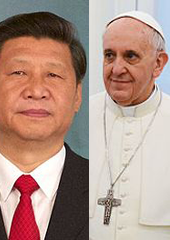The Ukrainian Crisis: A Question of the World’s Future
What is the rational course to take? Should we continue to be driven by warmongers?
March 27, 2014

So we have a new global reality: The Crimean peninsula belongs to Russia again. Ukraine is effectively split between the East and the West, as far as the two populations desire. Meanwhile, the Syrian government is winning the civil war in its borders, while the Taliban is winning its war against the United States.
Rather than engaging in a political blame game, as is the constant inclination in Washington (“It’s all Bush’s fault. — No, it’s Obama’s!”), we should step back and take a broader look. If we do that, we would discover that U.S. foreign policy of the past two decades has been a failure on a bipartisan basis.
The recent invasions and incursions by “the West” in Somalia, Iraq, Afghanistan, Egypt, Libya, Syria and other countries of the Arab Spring resulted in disastrous consequences. Fanatical warriors from Taliban and al Qaeda to — as we may soon learn — Ukrainian neo-Nazis have made the democratic cure worse than the dictatorial disease.
Going tit for tat
That evidence-based assessment doesn’t seem to concern the United States and its foreign policy establishment. It now seems keen on poking the Russian bear — until the bear reacts and a new confrontation develops.
I know there will be those who are shocked by my statement above. But let me remind them about the 2001 “Rose Revolution” in Georgia and the 2004 “Orange Revolution” in Ukraine. Neither event improved those countries’ economies, strengthen democracy or really reduce corruption.
On the contrary, those “revolutions” further damaged the middle class, enriched oligarchs and split their societies into two camps, if not belligerent classes.
And now, the new revolution in Ukraine reincarnated the ogre of Stepan Bandera [http://en.wikipedia.org/wiki/Stepan_Bandera], a Nazi collaborator who killed Jews and Poles during the World War II. The West is playing this development down and looking the other way. Russia, on the contrary, is playing the right-wing extremism up. It uses it as an argument to return Ukraine to the fold of the Russian empire.
Who is the “West”?
The West imposed economic sanctions on Russia — and declared the Crimea referendum illegal. But who is “the West”? Is it the United States that encourages democratic revolutions around the world — as long as those revolutions are friendly to the United States?
Or is it the European Union that tries to expand its market into the East? Or do they actually act in tandem? And what do toiling masses of the West want?
Most Americans don’t want to spend their tax money on foreign wars and revolutions: “Let them duke it out, it’s not our business, we have problems in our own land.” Most Europeans are not crazy about wasting their tax money on foreign affairs either. But the West’s military-industrial barons and their hired politicians do a very good job of leaving no opportunity untouched to beat the drums of conflict acceleration.
Some Washington think tanks, such as American Enterprise Institute, sponsored to a considerable extent by defense interests and arch-conservatives, have always gone on the war path, calling for “boots on the ground.” Do they care if the boots on the ground become the graves in the ground? I think not.
It is as if they suffer from a case of convenient, but dangerous amnesia. After all, the recent U.S.-driven “boots on the ground” episodes in Iraq and Afghanistan, pushed incessantly by the same group of “think” tanks, didn’t go so well.
Unperturbed by reality, U.S. neocons continue to play violent geo-political games for their own advantage. In their myopic vision, they always rush to the next fight — and they don’t even care if they win it as long as they get paid for their “strategic-thinking” and propagandizing. Business is business, after all.
One wonders: Are they engaging in these arguments to do their sponsors’ bidding — to continue their personally very confortable lifestyle as an armchair warmonger? Mind you, all these fine strategists always call on others to go into war.
Bigger than Ukraine
Undoubtedly, the Ukrainian question is bigger than Ukraine. It is a question of the world’s future. It would be an overstatement to say that Putin’s effort to restore Russia’s superpower status leads us back to a bipolar world — Russia and China in one camp versus the United States and the EU in the other.
The key issue now is to make sure one understands that Putin’s Russia, unlike the old Soviet Union, is not belligerent to the capitalist system. The reason is simple. It cannot afford to do anything else. Its global share of GDP — at around 2% — is far too small.
Plus, Russia is essentially a commodity exporting state and depends (also) on the graces of its customers. The task ahead is to make sure that Russia can deal with the rest of the world as well as China.
Yet, the Washington establishment now acts in order to get the rest of the country to see Russia, once again, as the United States’ “main geo-political foe.” The United States claims to be the great democracy-exporting country — even though it has a historical record of collaborating with foreign dictators such as Ngo Din Diem of Vietnam, the Shah of Iran, Ferdinand Marcos of Philippines and the kings of Saudi Arabia, Kuwait and Jordan.
To be sure, Russia is also hypocritical. Domestically, it practices “limited democracy” and calls its new Tsars “Presidents.” Internationally, it sells weapons to the dictatorial Iran and Syria.
But let’s call a spade a spade — both countries vie for world domination and both fail domestically, although to a different degree. U.S. democracy is limited because big corporations unduly influence the government. Generally speaking, the Russian government controls the oligarchs, while in the United States, its “oligarchs” — aka big corporations — control the government.
Caution needed
Meanwhile, extra caution is needed. The reading on the wall is clear for all to see: The twin epidemics of searing national and religious conflicts is moving us ever closer to bring the world to the brink of anarchy. That, in our time of nuclear proliferation, can be catastrophic.
If Russia and America want to save the world, they should stop fighting and start cooperating. The two powers can begin with Ukraine. Historically, like it or not, this country belongs to Russia — and it began as Russia more than 1,000 years ago. To paraphrase the famous motto by Winston Churchill, Russians and Ukrainians are the same people separated by a common language.
Of course, the EU is also a key actor in this equation. And it above all must realize that, to chisel all of Ukraine from Russia, is to hurt all three parties of this equation. Ukraine would remain a failed state, because it needs systemic changes, not financial bailouts.
Too much rashness on the part of the European Union would mean that it would lose the Russian oil and gas supply and would have another failed state on its hands — in addition to Greece, Italy, Portugal and Spain.
The potentially resulting military confrontation would become more intense and might bring the entire region to another war. Yulia Tymoshenko, the former Prime Minister of Ukraine and an oligarch herself, has already threatened to annihilate Russia with nuclear weapons (!).
So far, the poked Russian bear woke up twice in this century, the 21st — once in Georgia and once in Ukraine — and both times the bear won those chess matches and added to his territory.
Perhaps, it’s time to stop poking the bear and collaborate with him to solve the global problems of terrorism, anarchy, the distraction of natural environment and nuclear proliferation. Perhaps, the European Union can act as an effective arbiter in this process.

Takeaways
The Ukrainian question is bigger than Ukraine. It is a question of the world’s future.
U.S. foreign policy of the past two decades has been a failure on a bipartisan basis.
The incursions by the West from Somalia, Iraq, Afghanistan to Egypt, Libya and Syria had disastrous consequences.
Fanatics like Taliban, Al-Qaeda and Ukrainian neo-Nazis make the democratic cure worse than the dictatorial disease.
The Russian government controls the oligarchs. The U.S. oligarchs – big corporations – control much of Washington.
Read previous

Zwei Hirten. Zwei Kulturrevolutionen?
March 27, 2014
